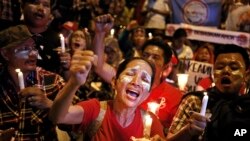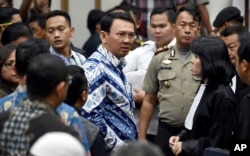Rights groups are worried about religious freedom in Indonesia after Jakarta’s Christian governor was given a two-year jail sentence for his comments on Islam.
A five-judge court ruled on Tuesday that Governor Basuki Tjahaja Purnama was guilty of blasphemy against Islam.
Blasphemy is defined as showing disrespect to God or to something considered holy. It is a crime in Indonesia, the world’s fourth most populous nation.
Government lawyers had proposed no prison time for the governor. But the judges rejected that suggestion.
The governor, best known by the name Ahok, is an ethnic Chinese Christian. He lost in his effort to get re-elected last month. He was leading in opinion studies of likely voters. But his popularity dropped when some Muslim religious leaders said Islam’s holy book, the Quran, barred Muslims from voting for a non-Muslim.
Ahok responded by using a verse in the Quran to argue that there is nothing stopping Muslims from voting for non-Muslim candidates. Ahok’s statement was edited in a video, which appeared on social media. Some said the meaning of his statement was changed.
But Ahok’s critics likened his comments to blasphemy. That led to the criminal charges against him, and Tuesday’s guilty ruling.
In announcing its decision, the five-judge panel said Ahok was “convincingly proven guilty of blasphemy.”
Supporters of the governor cried as the panel announced its decision. Members of conservative Islamic groups cheered the guilty finding.
Ahok began serving his two-year sentence immediately. He was taken to prison in East Jakarta. His supporters joined together outside the prison to demand his release. Ahok announced plans to appeal the ruling.
Human rights groups called the court decision a major setback to the freedom of Indonesians.
Charles Santiago is chair of the ASEAN Parliamentarians for Human Rights. In his words, “The verdict is deeply disconcerting not only for Indonesia, but for the entire ASEAN region. Indonesia was thought to be a regional leader in terms of democracy and openness,” he said.
Indonesian President Joko Widodo is a supporter of Ahok. He called on the Indonesian people to respect the court ruling, as well as Ahok’s right to appeal the decision.
Ahok lost last month’s election for Jakarta governor to Anies Baswedan, a former minister of education and culture. The blasphemy charges against Ahok were a big issue in the election campaign. Anies is to take office in October.
Until then, Jakarta’s deputy governor is to serve as governor.
Although 87 percent of Indonesians are Muslim, the constitution officially protects six religions, including Christianity. It gives no special protection to Islam.
But Phelim Kine, deputy Asia director of Human Rights Watch, said Indonesia’s blasphemy law has been used to attack members of non-Muslim religions. He said the court ruling and prison sentence given to the Jakarta governor is just the latest example.
Kine said that the government has also attacked sexual and gender minorities through hateful words and discriminatory rules.
On April 20, United States Vice President Mike Pence visited Indonesian President Widodo in Jakarta. He said the two countries share many common values.
“As the second and third largest democracies in the world, our two countries share many common values -- including freedom, the rule of law, human rights, and religious diversity,” Pence said.
I’m Caty Weaver.
Fathiyah Warada reported on this story for VOANews.com. Bruce Alpert adapted the story. His report contains additional information from Reuters and the Associated Press. George Grow was the editor.
We want to hear from you. Write to us in the Comments Section and share your views on our Facebook Page. How important is religious freedom to you.
_______________________________________________________________
Words in This Story
respond - v. to say or write something as an answer to a question or request
edit – v. to change or amend something, such as a document, tape recording or film
convincingly - adv. causing someone to believe that something is true or certain
setback – n. a defeat; a barrier to progress
verdict - n. a ruling
disconcerting - adj. disturbing
region - n. a part of a country, of the world, etc., that is different or separate from other parts in some way
diversity - n. the state of having people who are different races or who have different cultures or religions in a group or organization










